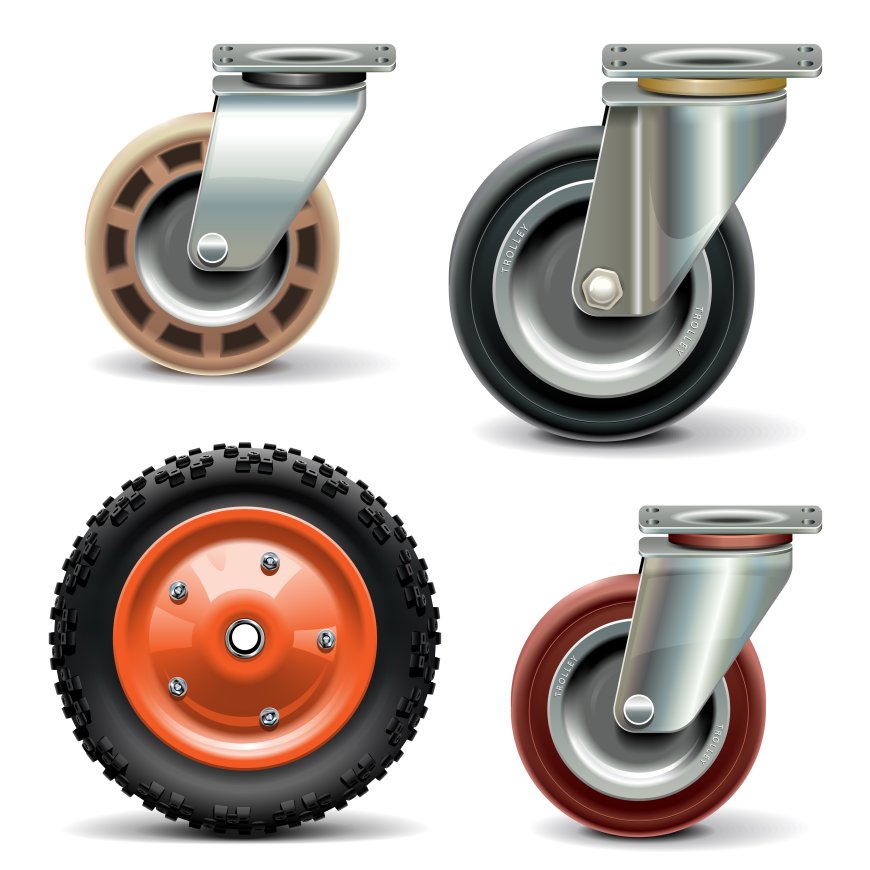Top Benefits of Using High-Quality Wheels in Material Handling Equipment
Discover the top benefits of using high-quality wheels in material handling equipment for better durability, safety, efficiency, and long-term cost savings.

In industrial, commercial, and warehouse environments, material handling equipment such as trolleys, carts, and dollies play a vital role in daily operations. While much attention is given to the structure and design of this equipment, one critical component often overlooked is the wheel.
The quality of wheels used in material handling equipment can significantly influence performance, safety, and cost-efficiency. Whether you're managing a factory floor, a retail backroom, or a logistics hub, investing in high-quality wheels is essential for long-term success.
Here are the top benefits of using high-quality wheels in material handling equipment.
1. Enhanced Durability
One of the most significant advantages of high-quality wheels is their long-lasting durability. These wheels are typically made from robust materials such as polyurethane, rubber, or high-impact nylon, which are engineered to withstand frequent use and varying load conditions.
Durable wheels:
-
Resist wear and tear
-
Maintain shape under pressure
-
Perform consistently over time
This means fewer replacements, lower maintenance costs, and greater reliability in demanding environments.
2. Smooth Mobility and Performance
The ease with which equipment moves across a facility can have a direct impact on productivity. High-quality wheels ensure:
-
Smooth and consistent rolling
-
Reduced push/pull effort
-
Better maneuverability
They’re designed to work on various surfaces, including concrete, epoxy, tile, and vinyl, without getting stuck or causing disruption. Smooth movement reduces operator fatigue and allows for faster, more efficient workflows.
3. Higher Load-Bearing Capacity
Heavy-duty tasks require wheels that can support significant weight without failing. High-quality wheels are rated for specific load capacities and built to handle everything from light-duty carts to heavy machinery.
Using wheels with appropriate load ratings ensures:
-
Equipment stability
-
Safer material transport
-
Extended operational lifespan
Selecting the right wheels for your load requirements is crucial for both performance and safety.
4. Floor Protection
Wheels that are poorly designed or made of low-grade materials can damage floors over time, leaving scratches, dents, or marks. High-quality wheels are made to minimize floor wear by offering:
-
Better shock absorption
-
Even weight distribution
-
Non-marking materials
This is especially important in environments with polished or delicate flooring such as hospitals, showrooms, or offices.
5. Reduced Noise Levels
Noise pollution is a concern in many workplaces. High-quality wheels, especially those made from rubber or thermoplastic rubber (TPR), are designed to operate quietly and smoothly.
Low-noise wheels are ideal for:
-
Healthcare facilities
-
Libraries
-
Corporate offices
-
Hospitality environments
6. Improved Safety and Control
Workplace safety should never be compromised. High-quality wheels contribute to a safer work environment by providing:
-
Better grip on various surfaces
-
Controlled movement and braking
-
Stronger locking mechanisms
Wheels with precision bearings and stable swivel action also help prevent tipping, slipping, or unbalanced loads during transport, protecting both workers and materials.
7. Cost-Effective in the Long Run
While high-quality wheels may come at a higher initial cost, they offer long-term savings by:
-
Lasting longer than low-grade alternatives
-
Reducing the need for frequent replacements
-
Minimizing damage to floors and equipment
-
Lowering downtime due to wheel failure
The upfront investment pays off through better efficiency, fewer disruptions, and reduced maintenance over time.
Conclusion
Choosing the right wheels for your material handling equipment is not just a minor detail — it’s a crucial decision that affects productivity, safety, and operational cost. High-quality wheels offer durability, smoother operation, higher load capacity, floor protection, and noise reduction, making them indispensable for any professional environment.
Whether you're upgrading existing carts or investing in new equipment, focusing on wheel quality will ensure smoother workflows, better safety, and lasting value across your operations.
























































































